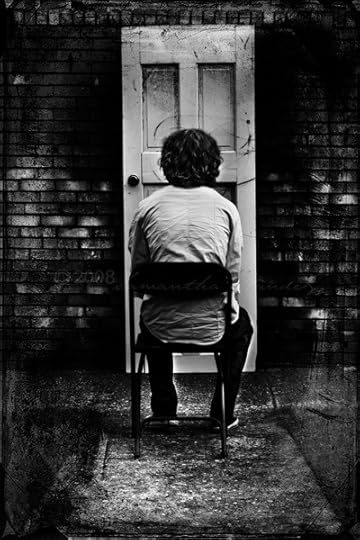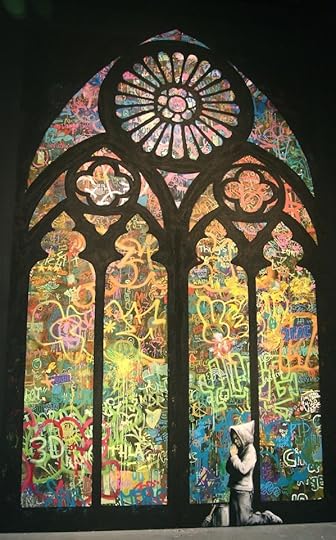Jim Palmer's Blog, page 73
April 28, 2013
The personal work of transformation is messy.
“I remember back in the day, being asked to write out my “personal testimony.” The three parts of a good testimony were: (1) How messed up I was before meeting Christ and getting saved; (2) My getting-saved/ come-to-Jesus experience; (3) How my life miraculously changed with Jesus now in my life.
This idea of transformation can be detrimental. Rather than fully engaging a process of personal growth and doing the personal work involved, we become passive, waiting for the next big God-experience or encounter to miraculously change, transform, fix, or heal us. Transformation is not something that happens ‘to’ you or someone (including God) does ‘to’ you. If you’re waiting for transformation to happen in your life, you’re going to be waiting a loooong time.
Your active, ongoing, and evolving relationship with yourself, God, others and life is all part of personal transformation. Even “miraculous moments” of transformation are preceded by all kinds of factors that made such a moment possible.
People sometimes feel shame (what’s wrong with me) because they have not had one of those God-miraculously-changed/healed-me experiences. People pray day after day that God will change, transform, fix or heal them, and feel betrayed that it doesn’t happen.
The scriptures say we already have everything we need for life and wholeness. But it’s a journey to discover, access and re-condition ourselves according to the truth of we are and what we have. I wish God would just zap me and be done with it. Not gonna happen! The reality is that personal growth and true transformation isn’t for the faint of heart, which is why everyone isn’t doing it.
The personal work of transformation is messy. It will take you to places you’ve spent your whole life running from, ask you to let go of those things you have held onto for comfort and security, confront you in areas that feel too much to bear, require you to do the very thing you know you cannot do, and drive you to the very end of yourself where you must face your fears, and be vulnerable.
Transformation is not a linear process – a line of growth and maturation steadily going up. It’s one step forward, two steps back. It doesn’t happen all at once… it happens in bits and pieces and stages over time. For every one breakthrough, there are five breakdowns.
Audrey Lorde once described herself by saying, “I am my best work – a series of road maps, reports, recipes, doodles, and prayers from the front lines.” That sounds about right. Transformation is not something that happens at a point in time. Transformation is happening all the time, and sometimes we don’t even recognize it. I’m not even sure it’s advisable to make transformation a goal as if it is something to achieve. Life is inherently a transformative process – it’s like a dance. You just have to keep dancing.”
- Jim Palmer, Notes from (Over) the Edge


April 27, 2013
“Happy” = good? “Unhappy” = bad?
“People put a lot of energy into getting their life circumstances to be a certain way so they will be happy. It also includes what we do to avoid or prevent other circumstances that we imagine would make us unhappy. The fundamental flaw of this idea is that all of life is characterized by impermanence, and continuously changing. As long as you have conditions for happiness, expect to be disappointed. If there are changes you need to make in your life and circumstances, by all means make them. But if you had a choice, would you rather put your eggs in the basket of being able to achieve and maintain the perfect set of conditions or state of being, or would you rather have a peace and contentment that was unmovable and unconditional? We divide up live into two main categories: “happy” and “unhappy.” We want “happy,” and we don’t want “unhappy.” “Happy” = good. “Unhappy” = bad. But what if there was a third option that involved giving up and freed from that dichotomy altogether?”
- Jim Palmer, Notes from (Over) the Edge


April 25, 2013
“Know thyself.”
“Our experience of life is a process of selection, organization, and interpretation. At every stage in this process, which happens subconsciously and reflexively, our past experiences have influenced and determined our particular way of doing this. Life shows up in an infinite number of ways in each moment. It’s too much for one to take it all in, and so we make choices and select a limited number of things to focus on. Those specific things you select are related to the way you have been conditioned by your past experiences in life.
The next thing we do is organize those things we have chosen to focus on in accordance to a mental model, framework, story or script we have created about the world. Our minds recognize patterns and we make mental models out of them.
The last step of the process is that we apply meaning or interpretation to what is happening, which we derive form whatever mental model or framework we have attached our experience to. In every moment of life this is what we are doing -> selection, organization, interpretation, all of which has been influenced by our past experiences.
For example,
1. A young girl (Mary) grows up, abused by her father.
2. Mary becomes an adult and has two marriages with men who turn out to be abusive.
3. Mary’s boss at work is manipulative and suggestive.
4. Mary develops a mental model that says “men are a threat.”
5. Mary is at the grocery store. Out of all the things going on around her, what she most seems to notice is a man that seems to be looking at her. Mary’s mental model pops up – “men are a threat.” The man begins to approach Mary as if he may speak to her, but Mary pretends not to see him and quickly moves on to another section of the grocery store.
6. The man recognized Mary because they both have children with Autism, and he remembers her from a symposium they both attended about children with Autism.
7. The connection between the two may have been mutually beneficial in very significant ways but Mary’s mental model was an obstacle.
We have mental models for everything – ourselves, God, others, life itself, etc… and we force life to fit into those mental models. We just do it subconsciously and reflexively.
But what if our mental models are false? What if our mental models are limiting? What if our mental models sabotage our lives? What if God, truth, self, others and the way things truly are is bigger and beyond what any mental model is capable of holding? How much of the life you desire is outside and beyond the mental models you are doing life with?
This is why Socrates wrote, “An unexamined life is not worth living.” In other words, until we spot and deconstruct our mental models about life, we are slaves to them. Jesus said if the eyes are good, the whole body will be well. In other words, how we see the world will determine our experience of it. To perceive things as they truly are is to free oneself from suffering.
We have heard the aphorism, “Know thyself.” I went to seminary and earned a Master of Divinity degree and was a Senior Pastor for many years. I operated with the premise that what people needed most was correct doctrine about God. People knew God inside and out; the problem was that they did not know themselves.”
- Jim Palmer, Notes from (Over) the Edge


April 24, 2013
“Life is what you make it.”
“If I said there is no inherent meaning to life happening or evolving around you, it would likely cause upset. At a fundamental level, most people subscribe to the idea that life has meaning. In fact, many people hold to the idea that life has meaning because God has a plan and is continuously weaving together the circumstances of our lives to achieve it. This is what people often mean when they say things like, “God is in control” or “God has a purpose in everything.”
But consider for a moment that one of our essential characteristics as being born out of the image, likeness and being of God is that we are creators. What if life doesn’t have a predetermined, inherent, or set meaning, but we are invited to create it? What if life is just what happens, and you and I create or add the meaning?
We know already that no two people are ever experiencing the same meaning of life. All of life is happening as a byproduct of our perception, which is the process of selecting, organizing and interpreting the information we collect through our senses – what we see, hear, taste, smell and touch. But even this perception happens inside a personalized map, model, construct, script, story or frame that we have been conditioned into about the way things are. The mind further develops prototypes, paradigms, concepts, categories, stereotypes and labels that further reinforce our particular view.
We have all heard it said, “Life is what you make it.” This may be more true than we imagined. Life is going to show up in a way that supports our personalized story, map, model, script, and construct. For many of us, that’s the bad news because our model or script is false, inadequate, lacking or self-sabotaging. The good news is that because you created it, you can divest your commitment to it, and create something different. It takes time to deconstruct and reconstruct the frame or model with which we interpret the meaning of life.
I don’t think there is a formula for this but here are two ways to think about exploring this further: (1) What are your highest notions about yourself, life, God, humankind? What would it be like if “integrity” meant honoring those highest notions in every moment? (2) Rather than the burden of trying to determine some conclusive or positive assertion about how everything is or should be, identify all the things you know it’s not and just be present to what emerges in the absence of all that clutter.”
Jim Palmer, Notes from (Over) the Edge


April 23, 2013
The miracle of Jesus was his humanity.
“The miracle of Jesus was his humanity. It takes guts to be human the way Jesus was. His life was a stand for the divine worth of every human being. Jesus is not about going to church, being good, reading through the Bible in a year or proper systematic theology. Jesus is about putting yourself in the line of fire, standing for the worth of a woman who had been condemned as a whore and thrown in the dirt to be executed.
You want to “be like Jesus”? How far will you go in standing for the divine worth of every human being? How about a Zero Tolerance policy – indiscriminately honoring and defending every human being as a child of God, and acting whenever you see that worth diminished.
So many people in this world have given up on themselves are on the brink of doing so. Being Jesus means not letting them. That includes not giving up on yourself, and being a stand for you own worth and value.”
- Jim Palmer, Notes from (over) the Edge


April 21, 2013
Yeah, but…
“Pain will always be a part of the human journey it’s a natural and spontaneous reaction to what happens. If I hit my finger with a hammer, it will hurt. If I lose a loved one, I will feel grief. No amount of awakening, enlightenment, transformation or spirituality will ever change this. Pain is inevitable. If you are alive, you will experience pain. Pain plays a good, useful and protectionary function. For example, you would want to know that the frying pan handle is hot before your skin started charring. Pain warns us of dangerous situations. Pain also motivates us to change. For example, experiencing the pain of an unhealthy relationship motivates us to seek counseling or leave the relationship if that is what is necessary.
Suffering, however, is the result of how we interpret or understand pain, or our inability to let go of it. Suffering is what we add onto our physical pain, illness, grief, or loss. It is the commentary and judgment we place on ourselves and life. Suffering often takes the form of unhappiness, anguish, fear, emptiness, lack of peace, dissatisfaction, bitterness, loneliness, misery, dis-ease, restlessness, disappointment, stress, addiction, codependency, etc…
You cannot escape the reality of human pain. Though there are ways you can lessen or postpone it, like practicing habits of good health to lower your risk of disease, you still will have sickness and other forms of pain. You can’t prevent or stop pain in your life and as we just saw, it wouldn’t be advisable to eliminate pain from your life even if you could.
However, you can put an end to your suffering. This is good news, because it’s the suffering (not the pain) that causes your unhappiness and the list of other things mentioned above.
There’s only one approach that will end suffering, which is to say, “I want to end my suffering, whatever the answer may be to end it.”
It can’t be a “Yeah, but….” thing. It can’t be:
“I want to end my suffering but…
it must be comfortable,
it must be something that fits into what I already know,
it must be understandable to my mind,
it must abide by my conditions.”
That will never work. It must be an unconditional and unqualified commitment – “I want to end my suffering, whatever the answer may be to end it.”
Even now your mind/ego feels threatened and is pushing back by saying, “Yeah, but what if ending my suffering means killing or harming people? If I applied that logic I might go out and murder people.” It’s just a smokescreen because your mind/ego doesn’t want to give up control. Jesus referred to a peace not of this world and beyond your knowing. satisfying your mind will not lead to peace or end your suffering.”
- Jim Palmer, Notes from (over) the Edge


April 18, 2013
There is no fear in love…
So much of religion seems to be about fear:
fear of going to hell;
fear of having bad theology;
fear of not satisfying your end of the bargain so God will favor you and bless you;
fear of others finding out how much you’re not really like the person you project and pretend to be;
fear of trusting your own inner guidance and fear of thinking for yourself;
fear of not upholding the expectations of your religious sub-culture;
fear of sexuality;
fear of people who are different;
fear of the world…
I spent over a year soaking in one verse of scripture, “God is love” and every one of those fears disintegrated. There is no fear in love, or so I learned.


April 16, 2013
Five Things That Could Be Central To What Your Life Is About…
Five Things That Could Be Central To What Your Life Is About As Opposed To All The Huge And Earth-Shattering Things We Are Told It Should Be:
1. Being a soul friend.
When you connect with another person and become completely open and trusting with that individual, your two souls begin to flow together. Being a soul friend is accepting another as they truly are, holding them in beauty and light. With a soul friend, you are understood as you are, without mask or pretension. This recognition and acceptance provides a space for others to discover and express their real self. There are few things more significant than being a soul friend, cultivating these kinds of relationships, being a space of acceptance and recognition for others, and holding up a mirror for people to see their light.
2. Participating in the awakening of your children.
Could it be that one of your most significant contributions to this world will be your attentiveness and mindfulness to awakening your children to the reality and beauty of who they are, and helping them learn to operate within in and express it?
3. Being a companion and caregiver to animals.
Have you ever considered that the cat or dog that showed up on your doorstep, or the one you took in, or adopted from an animal shelter, and the care and love you give them, is an extraordinary reason for being here?
4. Breaking the silence.
A lot of suffering happens in the world because people are silent. Maybe you are here because you were meant to speak. What if courageously speaking the truth, being a voice for people who have no voice, not keeping quiet and turning a blind eye to injustice, giving expression to something people are missing is central to who you are in this world?
5. Adding beauty.
Fyodor Dostoyevsky wrote, “The world will be saved by beauty.” And maybe you were meant to bring that salvation by contributing beauty in some form of your own. What if offering the beauty that you naturally create as an artist, musician, photographer, gardener, tattoo artist, writer, etc. is what you were meant to be and do in this world?


April 14, 2013
Did God die?
If you had lived during the time of Jesus, and especially if you had been a close friend or follower of Jesus, his swift and brutal execution would have been deeply disturbing and tragic. Jesus… the man of goodness, courage and compassion, the man of truth and wisdom, the man who stood with the downcast, rejected, poor and oppressed, the man who awakened people to the love and acceptance of God… arrested? Disgraced? Rejected and condemned? Beaten and broken? Brutalized? Executed?
And yet, what part of Jesus died? Did God die? Did life die? Did love die? Did truth die? Did peace die? Did goodness die? Did compassion die? Did beauty die? Jesus said, “I am the truth” and that “I am”-truth of Jesus was never threatened and never went away. This is good news – not just for a select group of people but the whole of humankind. Death is not the final word. What is born out of the image, likeness and being of God can never be separated from God. There is no “till death do us part.”
Jesus himself taught that death spawns new life – like a kernel of wheat that falls to the ground and multiplies. The hope belongs to people everywhere without distinction of race, religion, gender or anything else. What makes Easter so liberating is that the resurrection of Jesus holds monumental significance for the entire human situation. We share in the “I am” of Jesus and like him, who and what we are will not end in the tragedy of the grave.


April 12, 2013
What is our crime that separates us from God?
“Sin,” “repent,” and “eternal life” are among the top words and phrases that have taken on a meaning in pop-Christianity that Jesus would have never endorsed or taught. It just underscores the power of groupthink – that if enough people believe something, they will reason that it must be correct.
What is our crime that separates us from God? As the pop-Christian theory goes, our crime is being human. We are told that we are born “sinners.” Insert the misinterpretation of the word “sin.” According to the theory, before we do anything… we are born as babies “in sin.” In other words, we don’t get a choice; by virtue of being born human, we are at the core, “sinners.” The theory further says that this state is disgusting and revolting to God, which is why God rejects and condemns us, has nothing to do with us, and sends us to Hell… we are separated from God.
However, the word “sin” means to miss the mark or fall short. What mark? Fall short of what? Sin is falling short or missing the mark of realizing, accepting, being and giving expression to the complete and whole people God made us to be. Of course God “hates sin” – God hates anything in our lives that prevents us from knowing and experiencing our true nature, which is an extension and expression of the image, likeness and being of God. And God hates anything that prevents us from embracing the freedom, goodness, beauty, peace and freedom intended for all humankind. I love my daughter Jessica. I passionately desire her to know love, goodness, beauty, peace, freedom, wholeness and well-being. It’s heartbreaking to see any way she is not experiencing these, and I want to remove any obstacle in her life that would be preventing it.
Next, pop-Christianity inserts a misinterpretation of the word, “repent.” In the religious context, “repent” usually means acknowledging and grieving your sinful condition, turning from your wicked ways, throwing yourself on the mercy of God, and pledging to do better… or else! “Repent” is one of those religious words that conjure up images of judgment, condemnation, and fear.
Jesus often said in the gospels, “Repent, for the kingdom of heaven is near.” For years it troubled me that Jesus so often used this word because it represented everything that repelled me about religion. But then I learned its true meaning and significance. I discovered that the word “repent” (metanoia) actually means a change of mind or having a new mind. The word suggests a radical transformation of how we process reality.
Metanoia literally means “beyond the mind.” It’s the idea of stretching or pushing beyond the boundaries with which we normally think and feel. It often involves pressing beyond our religious conditioning about ourselves, God, others and life itself. When Jesus said, “Repent, for the kingdom of heaven is near,” he was saying that peace, freedom, fulfillment, and wholeness is present in every moment but it can’t be accessed or grasped through the religious mentality. “Repentance” as a way of life would mean acknowledging that what you most deeply want in life lies beyond what you already know or think you know. It involves approaching life from a place of “not knowing” and becoming more grounded in that inner voice that woos you toward what is truly good, beautiful, and liberating.
The pop-Christian gospel is then capped off with the promise of “eternal life,” which is normally associated with life after death or Heaven. This, despite the fact that Jesus described “eternal life” as the life of God that is continuously and unconditionally available to us, in us, for us, as us, and through us… in every present moment.
These ideas of sin, repentance and eternal life became the modern “gospel,” along with a host of other doctrines. They were conveniently labeled “orthodoxy,” implying that you could not even be a “Christian” unless you signed off on this doctrinal litmus test, which Jesus himself would not have supported. Just a cursory reading of church history raises some suspicion of how this popular Christian “orthodoxy” came into existence.
One of the biggest mistaken notions I carried around for years was that somehow Jesus Christ and Christianity were more of less the same thing or interchangeable. It makes sense; the Christian religion bears his name. It just seemed to go without saying – Jesus was in support of Christianity, and Christianity was in support of Jesus. It wasn’t until mush later that I learned that sometimes Jesus and Christianity can be two totally different and irreconcilable things.















